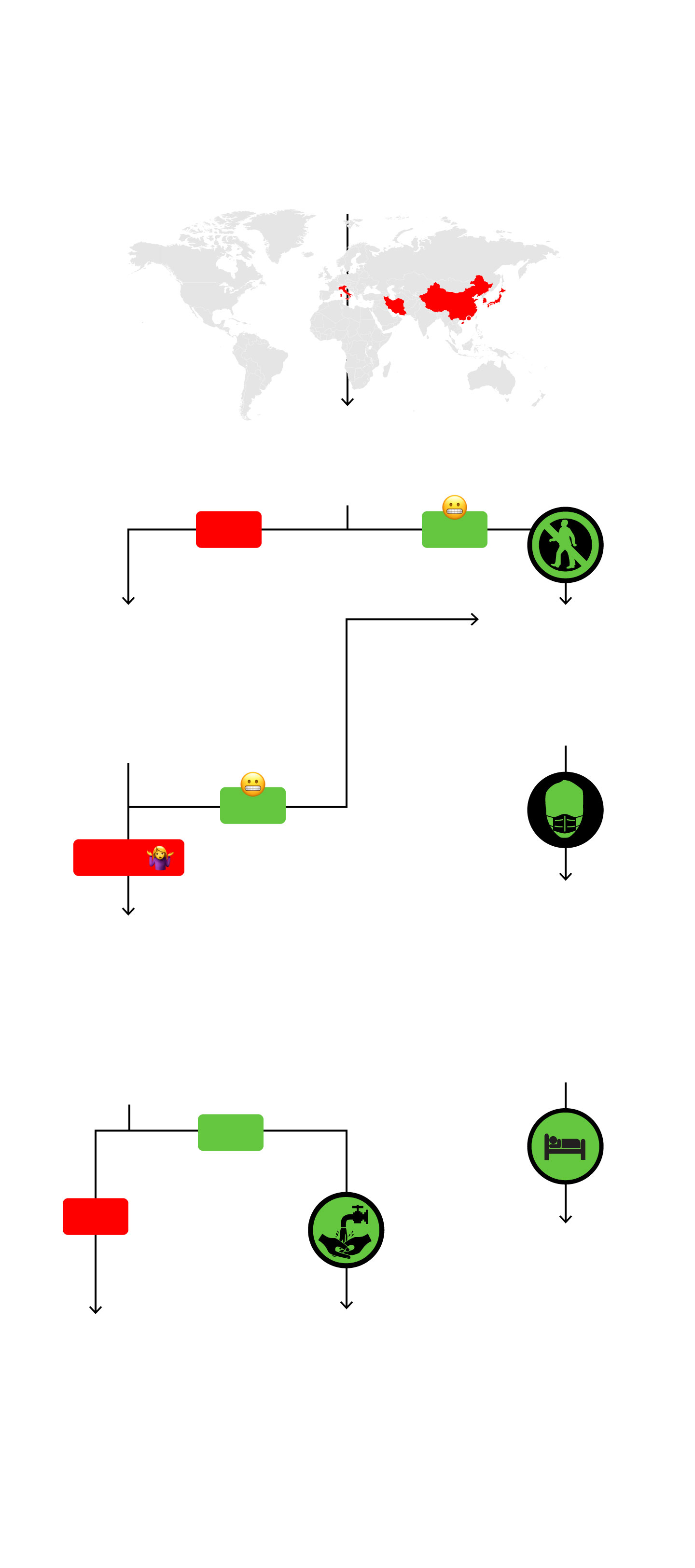What Should You Do If You Think You Caught the Coronavirus? Follow This Chart.
The CDC has guidelines that you should follow. We'll break them down here.

What to do if you think you have COVID-19, aka the coronavirus disease, and haven’t done anything yet.
“I’m not feeling well and I have symptoms associated with COVID-19: fever, cough, or respiratory issues such as shortness of breath.”
In the past 14 days have you returned from a country with COVID-19 travel restrictions in place by the CDC?
Currently China, South Korea, Italy,
Iran, and Japan.
Nope
Yes
Have you had “close contact?”
The CDC says this is “being within approximately 6 feet … for a prolonged period of time” — with someone with a confirmed case of COVID-19 within 14 days of their symptoms appearing (this includes health care workers).
Quarantine yourself.
The CDC actually calls this “home isolation,” but it means you need to stay in your home unless you’re receiving medical care. Here’s a list of things you need to do.
Yes
Nope or
Call your health care provider and let them know that you suspect it could be COVID-19.
Follow their instructions
(they’ll be following the CDC’s instructions about how to evaluate possible coronavirus patients) about how to approach working or where to go — and wear a face mask.
Do you have what
the CDC considers
an increased risk of complications?
Such as being immunocompromised; being older than 65; having chronic heart, lung, or kidney conditions; or if you’re pregnant.
Yes
Nope
Follow your health care provider’s instructions.
Including about how to self-isolate. If you have COVID-19, they’ll notify the Health Department and the CDC. Stay in touch with your provider — they will evaluate your condition and let you know when you can safely return to normal activities. Per the CDC, the decision to discontinue home isolation is made on a case-by-case basis. Monitor your symptoms, and if they become severe, seek emergency care.
If you discover you came into close contact with someone with the coronavirus or if you get severe symptoms, contact your health care provider.
Be vigilant and track
your symptoms.
If you experience severe symptoms or discover you were in contact with someone who may have been exposed via travel or exposed to others, call your health care provider.
Practice good hygiene — wash your hands, don’t
touch your face. Here’s

What to do if you think you have COVID-19, aka the coronavirus disease, and haven’t done anything yet.
“I’m not feeling well and I have symptoms associated with COVID-19: fever, cough, or respiratory issues such as shortness of breath.”
In the past 14 days have you returned from a country with COVID-19 travel restrictions in place by the CDC?
Currently China, South Korea, Italy, Iran, and Japan.
Yes
Nope
Have you had
The CDC says this is “being within approximately 6 feet … for a prolonged period of time” — with someone with a confirmed case of COVID-19 within 14 days of their symptoms appearing (this includes health care workers).
Yes
Nope
or
Do you have what
the CDC considers
an increased risk of complications?
Such as being immunocompromised; being older than 65; having chronic heart, lung, or kidney conditions; or if you’re pregnant.
Yes
Nope
If you discover you came into close contact with someone with the coronavirus or if you get severe symptoms, contact your health care provider.
Be vigilant and track your symptoms.
If you experience severe symptoms or discover you were in contact with someone who may have been exposed via travel or exposed to others, call your health care provider. Practice good hygiene — wash your hands, don’t touch your face. Here’s more on that.
Quarantine yourself.
The CDC actually calls this “home isolation,” but it means you need to stay in your home unless you’re receiving medical care. Here’s list of things you need to do.
Call your health care provider and let them know that you suspect it could be COVID-19.
Follow their instructions
(they’ll be following the CDC’s instructions about how to evaluate possible coronavirus patients) about how to approach working or where to go — and wear a face mask.
Follow your health care
provider’s instructions.
Including about how to self-isolate. If you have COVID-19, they’ll notify the Health Department and the CDC. Stay in touch with your provider — they will evaluate your condition and let you know when you can safely return to normal activities. Per the CDC, the decision to discontinue home isolation is made on a case-by-case basis. Monitor your symptoms, and if they become severe, seek emergency care.
There’s a lot we still don’t know about the coronavirus outbreak. Our newsletter does its best to put everything we do know in one place each day. Do you want to get everything worth knowing about the coronavirus outbreak, straight to your inbox every afternoon? Sign up for Outbreak Today here.
